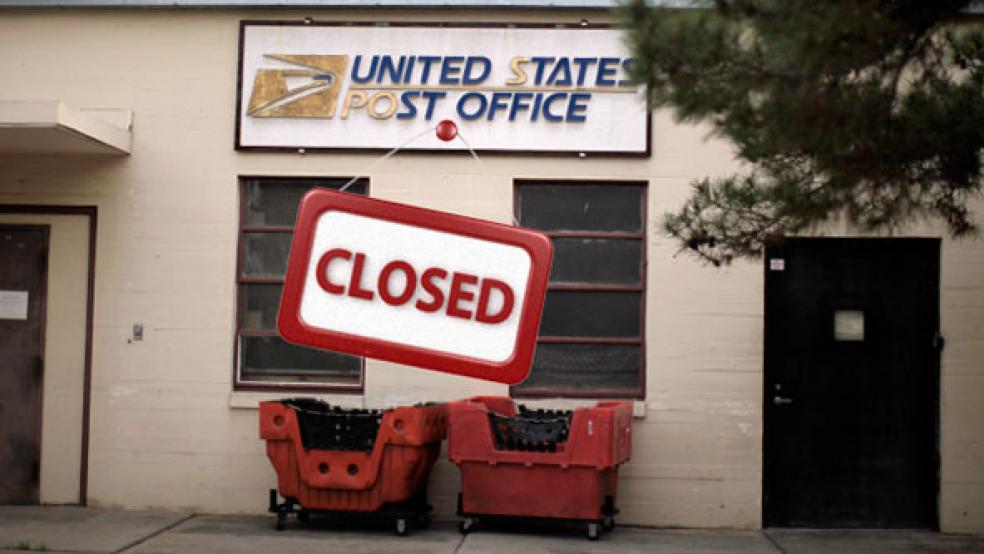The Senate advanced legislation on Wednesday that would allow the U.S. Postal Service to end Saturday mail after two years as part of efforts to overhaul the mail agency and prevent it from shuttering thousands of facilities next month.
The Postal Service has been losing billions of dollars each year due to the rise of online communications and high labor and other costs. Both houses of Congress have been working for months on legislation to restructure the agency and offer some relief. The Senate voted 62-37 to pass its bill, which would also let the mail agency use about $11 billion in surplus funds in a retirement account to offer early retirement incentives as a means to reduce its workforce.
RELATED: How the Postal Service Is Digging Its Own Grave
But while the bill was sponsored by a bipartisan coalition of senators, it faces a difficult challenge in the Republican-led House of Representatives. Leaders have yet to schedule a full House vote on the leading bill, which differs significantly from the Senate version, even though a committee approved it in October.
"This bill will bring the change that the post office needs to stay alive and serve the people and businesses of our country," Independent Senator Joe Lieberman, one of the Senate bill's sponsors, said before the vote. "Now we've got to challenge the House" to pass a bill, he told reporters afterward.
The Postal Service lost more than $3 billion last quarter, much of it due to a massive annual payment for future retiree health benefits. Postmaster General Patrick Donahoe has said the agency needs to cut operating costs by $20 billion by 2015, including ending Saturday mail delivery, taking over its health care plan and raising postage rates beyond inflation.
The agency also intends to close thousands of money-losing post offices and hundreds of mail processing facilities. Postal officials agreed late last year to a moratorium on closings through mid-May to give Congress time to pass legislation. The Senate bill would place some restrictions on which facilities can be closed, requiring the Postal Service to consider factors such as Internet access before closing a post office.
The final version of the bill also forces the Postal Service to keep some post offices open until after November elections to protect by-mail voting and to maintain rural post offices that are more than 10 miles away from another location.
PRESSURE ON HOUSE
The bill's sponsors said after the vote on Wednesday they hope the approaching end of the closings moratorium puts pressure on the House to act on its bill. The leading House bill, from Republican Representative Darrell Issa, takes a different approach to reform, creating oversight groups to close post offices and cut costs.
"I talked earlier today to Congressman Issa on the House side to encourage him to move the House version of postal reform, which is very different from our approach," Republican Senator Susan Collins told reporters.
Issa, who heads the House Oversight Committee, has criticized the Senate bill for returning the retirement-fund surplus and for restricting the post offices and processing facilities that can be closed.
RELATED: Post Office Closings Challenge Rural America
"Instead of finding savings to help the Postal Service survive, the Senate postal bill has devolved into a special interest spending binge that would actually make things worse," he said in a statement on Wednesday. Others, including rural-state lawmakers, took the opposite tack, criticizing the Senate for allowing the mail agency to close facilities.
Senator Joe Manchin, a Democrat, offered an amendment that would have extended for two years the moratorium on closings. His amendment failed to obtain the needed 60 votes on Wednesday, and he voted against the final bill. "Without the inclusion of a two-year moratorium, I will not support the final passage of the Postal Reform bill," Manchin tweeted.
Postal unions had also criticized the bill, with some organizing rallies and asking Twitter followers to tell their senators to vote against the bill. Fredric Rolando, president of the National Association of Letter Carriers, called the bill "flawed" in a statement on Wednesday and said the group would continue to fight for a postal overhaul that would eliminate the annual retiree health payment and not allow the agency to end thousands of jobs.



